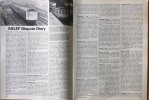I always remember in the 80s and 90s the timetable change used to be mid-May, typically between 11 and 17 May.
However, looking at old CWNs and marshalling books, it appears that the 1981/2 timetable started on 1 June instead.
Can anyone remember why this was? Interestingly the 1980 marshalling book for LMR is dated as expiring on 10 May 1981, which suggests the 'planned' timetable change was 11 May, which would be the 'normal' date.
So something must have happened in these three 'missing weeks' to cause the new timetable to be delayed. Prolonged industrial action perhaps?
Another interesting thing about this year (1981/82) is that the SR Central Division CWN was expected to run for the whole year, until May 1982. However (as evidenced by the November 1981 ABC timetable on timetableworld) the timetable changed during the course of the year, e.g. Victoria-Brighton semi-fasts switched to London Bridge, and the Arun Valley semi-fasts were re-routed via Sutton and Dorking on Saturdays. This was, I think, due to engineering works to prepare for Gatwick Express. However, I am surprised that this wasn't planned for in the CWN which definitely had a May 1982 expiry date.
However, looking at old CWNs and marshalling books, it appears that the 1981/2 timetable started on 1 June instead.
Can anyone remember why this was? Interestingly the 1980 marshalling book for LMR is dated as expiring on 10 May 1981, which suggests the 'planned' timetable change was 11 May, which would be the 'normal' date.
So something must have happened in these three 'missing weeks' to cause the new timetable to be delayed. Prolonged industrial action perhaps?
Another interesting thing about this year (1981/82) is that the SR Central Division CWN was expected to run for the whole year, until May 1982. However (as evidenced by the November 1981 ABC timetable on timetableworld) the timetable changed during the course of the year, e.g. Victoria-Brighton semi-fasts switched to London Bridge, and the Arun Valley semi-fasts were re-routed via Sutton and Dorking on Saturdays. This was, I think, due to engineering works to prepare for Gatwick Express. However, I am surprised that this wasn't planned for in the CWN which definitely had a May 1982 expiry date.


